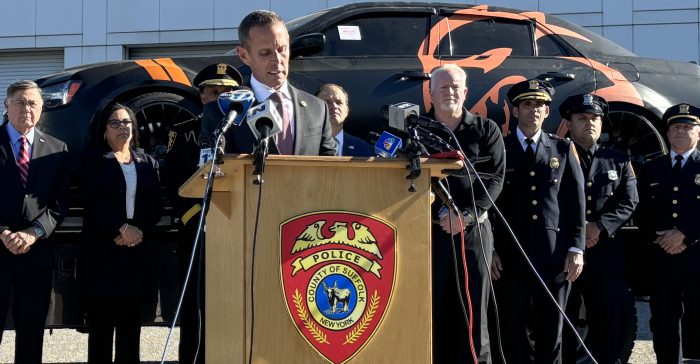Transportation authority to appeal decision
The Metropolitan Transit Authority stands to lose about $1.5 billion in revenue per year after a New York State Supreme Court judge ruled on Wednesday, Aug. 22 that the MTA payroll tax is unconstitutional. The MTA plans to appeal the decision made by Judge R. Bruce Cozzens Jr., according to a released statement last week.
This didn’t stop local officials from calling the ruling a “win for taxpayers” during a press conference last Thursday. Nassau County Executive Edward P. Mangano, along with numerous members of local and state government, were out in full force to applaud the decision, and plead to the powers that be to not grant a successful MTA appeal.
Employers located within the downstate area served by the MTA, which runs New York City’s buses, subways, commuter railroads and some major bridges and tunnels, pay the tax. The MTA serves 8.5 million passengers a day, according to its website. Its current budget totals nearly $13 billion.
Nassau officials asserted that the state needed home rule messages from the municipalities or a two-thirds vote in both houses of the State Legislature, neither of which occurred.
“The MTA payroll tax is a special law, which does not serve a substantial state interest,” Cozzens Jr. wrote in the decision. Because the state did not seek a home rule message, “this was passed unconstitutionally.”
Mangano filed the lawsuit in 2010. This was after the cash-strapped agency was looking to close a $1.8 billion budget gap, according to the supreme court decision.

Governor David Paterson enacted the tax in 2009. It was eliminated for small businesses with payrolls under $1.25 million and private and public school districts earlier this year.
“Today, we gather to seek retroactive relief from this unconstitutional tax,” Mangano said. “This costly tax has stifled economic growth by chasing employers and job creators out of our region.”
Employers pay as much as 34 cents per $100 of salaries via the payroll tax, according to figures released. Cozzens did not order or direct the state to stop collecting the tax.
The MTA noted in a statement that four previous lawsuits challenging the constitutionality of the payroll tax had been dismissed. Of all the cases with similar arguments, this case is the first to reach the appeal level.
“We will vigorously appeal [the Aug. 22] ruling,” the statement read.
Without the payroll tax or another source of funding, “the MTA may be forced to implement a combination of extreme service cuts and fare hikes,” the MTA statement read. “The Payroll Mobility Tax remains in effect for now, and we expect that it will survive this legal challenge.”
Nassau has paid $9.9 million in MTA payroll taxes since its inception, while county business owners have paid roughly $80 million per year. The county plans to seek retroactive relief for funds it has paid since the law was enacted. It is unclear if the county will be able to seek similar relief on behalf of county businesses, officials said last Thursday.
Mangano said if the MTA successfully appeals, he would rule out challenging that ruling.
“We’ll analyze that,” Mangano said. “Again, we call on them to listen with both ears to the loud message here that goes beyond the decision.”
Not surprisingly, Garden City’s Mayor Donald Brudie was among the elected officials rallying behind the overturn of the commuter tax. He was equally pointed about its effects on not only his village, but other small businesses that would have taken the brunt of this policy.
“If ever a tax was unfair, and we all think many taxes are unfair, this was one of them. It was targeted at the downstate area, the five counties of the City of New York, Nassau and Suffolk counties. It affects every small employer and in the legislature last year what they tried to do was try to repair a gaping wound in the tax code with a band-aid and that the band-aid was to reduce the amount that would be taxed of employers’ wages,” Brudie declared. “With that, what was an employer to do? He wanted to take the benefit of that bar, so to speak, and get his payroll below that bar. By doing that, he had to employ less people. So again, this was not a fix for the tax, it was a band-aid approach that made it worse because the employer, in order not to pay the payroll tax had to get his payroll below that, cut his business and cut his employers. We’re all suffering from this. When we have these funds back in our budget, they’ll be used for good purposes to benefit our taxpayers. We in Garden City have paid a substantial amount of money but as Mayor Strauss said, it’s a small amount in comparison to the hospitals, churches, schools and everyone else who has paid huge sums of money. This money can be better expended for the taxpayer and here on Long Island.”


























